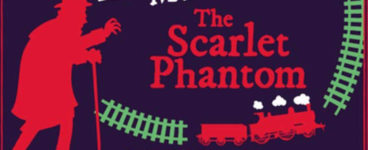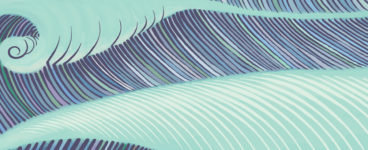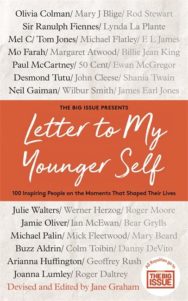Sound Advice
‘I thought my difference must be because I wanted to be a writer.’
For over 10 years The Big Issue magazine has asked some of the best known figures in sport, politics, business and entertainment to talk about their younger selves and to offer advice to that person they once were. Here we share extracts from interviews with two of BooksfromScotland’s favourite writers, Val McDermid and Ian Rankin.
Letter to My Younger Self: 100 Inspiring People on the Moments That Shaped Their Lives
Devised and edited by Jane Graham
Published by Blink Publishing
Val McDermid
At 16 I was preparing for my Oxford entrance exam. I was very driven and pushed myself in everything. I played hockey for the first eleven in the East of Scotland. I played guitar and sang in folk clubs. I won debating prizes. Everything I did, I wanted to do really well.
I was very much of the working-class generation that thought education was the key to doing well in life. My parents were bright people who passed their exams to go to high school but they had to leave at 14 because their families couldn’t afford it. They never got to reach their potential, so they very much encouraged me not to be trapped by circumstances. But my parents had mixed feelings about my going to Oxford. It was a long way from Kirkcaldy – the only time we’d gone to England was a weekend in Blackpool. And it was a long way intellectually as well. So I think they were really a bit nervous for me, as well as very proud. But I think they saw that I was always going to go my own way.
I became aware when I was at Oxford that I was drawing a line between my past and my future. I couldn’t articulate this when I was 16, but I think I wanted to spread my wings because of my sexuality. There were no lesbians in Fife in the ‘60s. I knew I felt different, and quite lonely, listening to Leonard Cohen and Joni Mitchell on my own, feeling that sense of both alienation and unhappiness. I thought my difference must be because I wanted to be a writer. If lesbians aren’t visible in your culture – on TV or in books and films – it’s very hard to come to that understanding by yourself. I’d spend hours walking with the dog along miles of coastline – days full of nothing but me, my dog and a book.
I did go out with boys. That’s just what you did. I went to parties, did the illicit drinking, a wee bit of smoking dope. On the face of it, I was the life and soul, but I knew I was going through the motions. The music I was listening to was a far better reflection of how I really felt. And I was singing in folk clubs, where you’d meet people hanging out in the back room – people like Billy Connolly and Gerry Rafferty. It wasn’t glamorous at all, but I was playing with people who were serious about what they were doing. If I hadn’t been a writer, I’d have liked to be a musician.
. . .
If I’m honest, I’m still a bit wary of the world and I still hold back a bit. Many women struggle to let go of that imposter syndrome; waiting for the moment when they turn round and say, ‘It’s not really you we wanted!’ When I went for my Oxford exam, the woman asked me how long I’d lived in Shetland. My heart contracted in my chest and I thought, ‘They’ve got the wrong person. It should be a lassie from Shetland sitting here, not me.’ I almost shouted, ‘I’ve never been to Shetland!’ She said, ‘But it says here you went to Fair Isle Primary School.’ I said, ‘That’s just a name!’ That was a terrible, terrible moment, and it’s never quite left me.
*
Ian Rankin
At 16, my life was all about rock music and books – I didn’t go out much. I grew up in Cardenden, a very working-class mining village with no private housing. I was surrounded by family – an uncle over the back fence and an aunt two doors along – so every move was monitored and you couldn’t get away with anything. Even if you didn’t feel like you fitted in, you had to look like you did because you didn’t want to get beaten up. I was happiest staying in my bedroom with my hi-fi and my records, writing painfully bad poetry about a lovely young woman who wouldn’t look twice at me.
I was painfully shy around girls. I still remember that crippling embarrassment of the two-month run-up to Christmas at school, when you stopped having PE and started having dance lessons. All the boys lined up on one side of the room with the girls on other side, and you had to pick a partner and spend the next 40 minutes dancing the Gay Gordons with them. You had to hang back to let the roughty-toughty kids get their first choice, because if you picked their favourite you’d get a kicking at playtime. It was nightmarish for everyone involved.
. . .
I think the teenage Ian would be dumbfounded by how his career has gone. If he dreamed of writing, it was as a literary novelist, not a guy whose books you’d buy in an airport bookshop. He’d want to be studied at university or as a set text in schools. I’m not sure he’d have wanted to be a wellknown popular writer, and I’m still not sure I’m used to it now. I might look quite relaxed on TV, but it’s taken me 20 years to get there. When I first went on The Review Show, I was an absolute bag of nerves.
Letter to My Younger Self: 100 Inspiring People on the Moments That Shaped Their Lives, devised and edited by Jane Graham is published by Blink Publishing, priced £16.99
All royalties from the sales of this book go to The Big Issue.
ALSO IN THIS ISSUE

 The Artie Conan Doyle Mysteries: A Q & A with Robert J. Harris
The Artie Conan Doyle Mysteries: A Q & A with Robert J. Harris
‘You really shoud stick to the facts,’ Ham advised. ‘I know you Artie. You won’t be able to resist t …

 ‘Good Listeners’ by Brian Hamill
‘Good Listeners’ by Brian Hamill
‘I’ve seen him on here before, you know, doing the same thing with other people, other girls, you kn …













